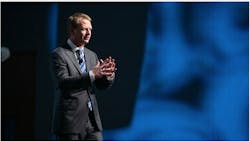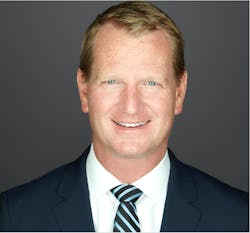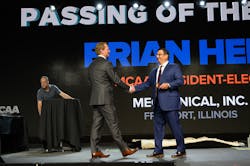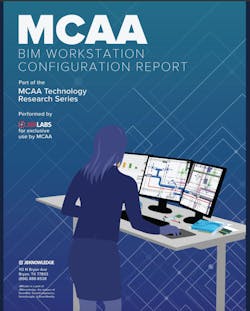At last week's 2019 convention of the Mechanical Contractors Association of America (MCAA) in Phoenix, Brian Helm, president of Mechanical Inc., Freeport IL, officially took the helm as the national group's new president. His plumbing and mechanical contracting firm, part of the Helm Group, provides CAD/BIM, building automation, fabrication, construction, engineering, facility management and mechanical services. Helm was named Mechanical's president in 2001.
Coincidentally, Helm’s first experience with the national MCAA was at an annual convention. To keep better informed about the state of the mechanical industry, he had joined both the MCA of Rockford and the MCA of Chicago chapters. In fact, he is a past president and board member of the MCA of Rockford. Helm also served on the Local 23 Joint Apprenticeship Training Committee, including several years as its chairman, and as a Pipe Trades Trust Funds trustee. He later became chairman of that group, which oversees the defined benefit pension and health and welfare funds.
At the MCA of Chicago, Helm served as a board member, as well as a member of the Local 597 Joint Apprentice Training Committee, which he also chaired for several years, and the Local 597 arbitration board.
At the national level, Helm was elected to the MCAA board of directors in 2013 and named vice president and assistant treasurer in 2017. Meanwhile, he also chaired its growing technology and education committees.
Mechanical Inc.’s mantra is “People Building Value.” As he rises to this new national leadership role, we talked with Helm about workforce recruitment and career development, the role of technology in mechanical contracting and his hopes for MCAA’s future.
How did you know you wanted to be part of the mechanical contracting industry? How did you get your start?
HELM: I grew up in a construction family. From a very young age, my brother and I were operating excavators and loaders on the land where we grew up. I couldn’t wait to turn 16 soI could work summers on the jobsite and in the shop. It was a real thrill to see new projects being built and knowing I had a small part in making it happen.
I was able to work with a lot of different construction trades butI saw that the mechanical scope is the real heart of the job; I knew it was where I wanted to make an impact.
What do you love about your job? What do you dislike about your job?
HELM: By far, the best part of my job is the great people I work with. Seeing a group of people roll up their sleeves and tackle a new project is the most rewarding feeling and the satisfaction we get from seeing it completed is amazing.
My biggest dislike is reviewing the contracts we sign. I understand we can’t go back to the days of a handshake but the time required to get to a mutually agreeable contract distracts from the good work we are trying to build. I understand we are contractors and it’s in our name, but the process of agreeing on a contract can be a real burden.
What piece of advice helped you in your career?
HELM: You make or break a project in the field. Everything the office does needs to make it easier for the people in the field to do their jobs.
What are you most passionate about in the industry? How do you hope to work on this issue while MCAA president?
HELM: I'm most passionate about the need for involvement in our industry. By that I mean this isn't an industry you justwork in; it's an industry whose strength and progress depends on the contributions of everyone who is privileged to be part of it.
You can't contribute if you're not involved. That's the beauty of MCAA; it is the perfect vehicle through which to get involved and contribute to your industry's strength and progress. That is the message I will convey throughout my presidency.
What’s the biggest problem facing mechanical contractors today?
HELM: Staying up with the technology change curve. Building information modeling has increasingly become a project requirement andit requirescontractors to adapt. It isn’t something that can be doneovernight. It takes years and investmentin hardware, training andmanpowerto become good at it.
The good news is that once your company integrates BIM into its processes, it opens up a lot of opportunities to increase productivity.
What is MCAA doing to recruit more people into mechanical contracting and engineering?
MCAA leads the industry when it comes to career development. This month we will be chartering one more student chapter, bringing to 59 the number of MCAA student chapters at colleges and universities across North America.
Hundreds of our member companies hire college students as interns every year, many with financial grants from our foundation. MCAA facilitates the process with job fairs at our annual Great Futures Forum and a job board on our www.mcaagreatfutures.org website.
Events at our annual convention, such as the Student Chapter Exhibit and the Student Union, also connect contractors and students. Our annual student chapter competition is the most challenging and thought-provoking in construction.
Are there initiatives to bring in more veterans and more women into the mechanical contracting trades?
HELM: Our labor partner, the United Association, established the VIP Program, an award-winning program providing active-duty military members a career pathway in civilian life through the piping trades.
MCAA's Women in the Mechanical Industry program is empowering women to further enrich and enhance their careers through networking, education, mentoring and career development opportunities beyond those already offered through membership in MCAA. The group will hold its first conference in Chicago in June.
What do you want your children to know about mechanical contracting?
HELM: My oldest is 16, so it’s time to start thinking about getting her involved in construction. Mechanical Inc. has a very successful summer internship program for high school CAD students which is right up her alley. We bring these students into the VDC department so they can apply what they have learned in a high school CAD class and within a short time, they are helping us produce our BIM models.
My kids, like these VDC interns, need to understand the importance of getting information to the field to make our installations easier. It’s all about supporting the field.
Are you optimistic about the future of mechanical contracting? Why?
HELM: I am very optimistic about the future of mechanical contracting because we are the ones doing the real work. Even with all the past and future innovations in the construction process, the pipe and equipment still need to be installed. You can’t skip that step andno one will ever suggest we can. It’s a great industry with outstanding people and a tremendous amount of opportunity.
If you only had one message to give to your fellow contractors, what would it be?
HELM: Getting back to my message of involvement, I tell every contractor I meet to get involved in MCAA. I can speak from personal experience; it is an investment in their time that will bring a tremendous return in knowledge and friendships gained. And the icing on the cake is their companies will be more competitive and profitable.
About the Author

Kelly L. Faloon
Contributing Writer/Editor
Faloon spent 3 1/2 years at Supply House Times before joining the Plumbing & Mechanical staff in 2001. Previously, she spent nearly 10 years at CCH/Wolters Kluwer, a publishing firm specializing in business and tax law, where she wore many hats — proofreader, writer/editor for a daily tax publication, and Internal Revenue Code editor.
A native of Michigan’s northern Lower Peninsula, Faloon is a journalism graduate of Michigan State University. You can reach her at [email protected].



